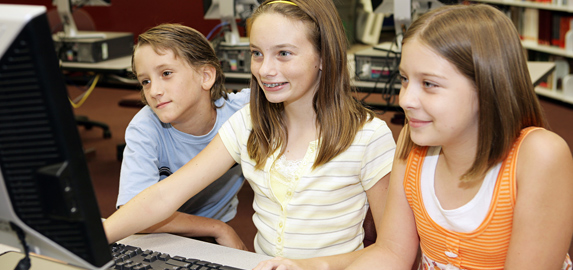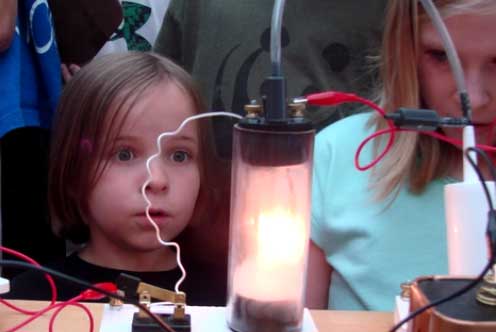Ultimately, what sets The New School apart is our mission to provide each child with an individualized, holistic program that meets their specific needs. Each child learns differently, has different interests, and develops cognitive and social skills at his or her own pace. By addressing individual needs, our specialized materials, prepared environment, and teaching approach guide each child to success and realization of their full potential.
Montessori Philosophy
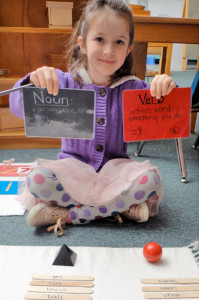
Our approach is based on the core principles created by Maria Montessori. For almost a century, these proven methods have been shown to enhance each child’s natural inquisitiveness and desire to learn. Because of their fundamental efficacy, these techniques have been the subject of much research, which has been empirically supported, and adopted by other educational programs. Many of the recent research findings have also served to bolster and fine-tune the Montessori philosophy throughout the years.
Children emerge from our program with kindergarten (and often some first-grade) proficiencies and knowledge. Just as importantly, and of more long-term impact, our kindergarten children develop the ability to learn independently and think critically. Skills that will prove invaluable to them throughout their lives.
The kindergarten year is the time in a child’s life when the brain is growing at an incredible rate, absorbing vast amounts of information. Your child is acquiring essential skills and work habits that will be needed in the workforce of the future. The New School kindergarten curriculum is designed to nurture cognitive, emotional, and social skills during this highly impressionable year for your child. The aim is to focus the child on understanding what is being learned, not just to gather facts, as with traditional education.
Key Aspects of our Montessori Kindergarten Program
Preparing your child for a successful future is the ultimate goal for him or her, you, and us. Our holistic kindergarten program will serve your child in many ways.
1. Fostering Critical Skills
The Montessori program offers a standard academic served elsewhere, but it also focuses heavily on developing many critical skills that will endure into adulthood: executive functioning (planning), self-motivation, confidence, independence, time-management, critical thinking, problem-solving, creativity, and more. Your Montessori kindergarten child will start to assert more control and direction during their day. They will use work plans to help plan their day and will begin to take more responsibility for their work. They will also adapt to readily accepting the concept that some work is required while balancing their time and effort between varied tasks.
2. Emphasis on Leadership
A key aspect of the Montessori philosophy is the three-year learning cycle. Your child’s kindergarten year is the first chance to explore leadership. This classroom experience is vital for the child’s social development. It is also gives the opportunity to reinforce and expand on knowledge and skills learned over the prior two years. Nothing cements a concept or skill quite like having to teach it to a peer or to present it to a teacher!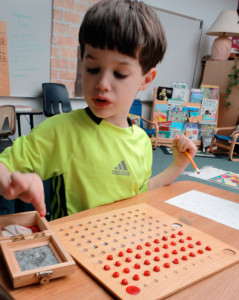
3. Predictors of Future Success in School
Peer-reviewed pedagogical and educational research supports the methods Montessori practitioners have been using for many years.* (In a controlled study, Lillard and Else-Quest (2006) found that children in their last year of Montessori primarily outperformed those who were in other types of kindergarten programs on social skills and behavior, executive function, early math, and early reading.
Researchers have shown that the most reliable predictor of future success in school is solid foundations in elementary mathematics and reading skills. Children with extensive vocabulary knowledge and early understanding of mathematical concepts have an advantage in their later schooling.** (Dohrmann (2007) reports on a longitudinal study that shows completion of early Montessori programs has benefits that persist into high school.)
The rich Montessori literacy and mathematics curriculum has a long track record of success. What sets Montessori students apart is their frequent use of tried and tested hands-on materials and exploratory based methods. These lead to a deep understanding of the subject matter with a solid foundation that supports the child moving toward abstraction and application of these skills.
*Lillard, A. S., & Else-Quest, N. (2006) THE EARLY YEARS: Evaluating Montessori Education. Science 313: 1893-1894.
**Dohrmann, K. R., Nishida, T., Gartner, A., Lipsky, D. & Grimm, K. (2007) High school outcomes for students in a public Montessori program. Journal of Research in Childhood Education 22: 205-217.
4. Methodology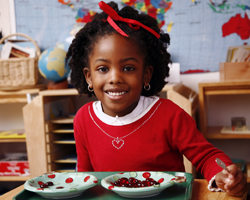
Montessori educators understand that children who learn by rote memorization using traditional methods are likely to encounter difficulty later on. Such children often fail to develop an early understanding of important concepts. The Montessori method focuses on learning by exploration and discovery — by far the best way for children to learn, retain, and achieve a true grasp of important principles. Our materials are designed to do just that. This is particularly true of the mathematics materials. These materials are nothing short of genius! Our parents often remark, “Ah, if only I were taught math that way, I would have progressed so much further!” Through our materials and techniques, students develop an understanding of essential concepts and use this foundation to apply progressively higher-level thinking skills to problems and challenges.
5. Holistic Approach
Your child is not a number to us. Each child is an individual with specific needs and is at the center of all we do. At the heart of our team-based approach, multiple professionals, including the administrators, discuss progress on each student. The student’s intellectual, developmental, social, and emotional needs are all considered when evaluating progress and well-being. Our dedicated staff and our multi-aged classrooms ensure this approach remains manageable and effective.
Useful Links
- Mindfulness Practices in Education: Montessori’s Approach
- Dohrmann, K. R. Outcomes for students in a Montessori program: A longitudinal study of the experience in the Milwaukee Public Schools. (2003). Association Montessori Internationale/ USA
- Overview of Research on Montessori Education: An Evidence-Based Curriculum. AMS Research Committee White Paper. Angela K. Murray, PhD, AMS Research Coordinator
- The Montessori Educational Council: Article on Montessori Kindergarten
- Google’s founders talk about the importance of their early Montessori education.
Please contact the school for more information.

